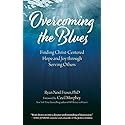I’m trying to remember back to the first time it happened. She had been mad before, but not this mad. She had been sad before, but not this sad. One day she confessed, when the children were little, she would buckle them into their booster seats, but leave her own seatbelt unclicked on purpose. Though she wasn’t actively suicidal, in her despair, she’d hoped God would take her so she could escape the intense emotional pain. We cried together that day, and she promised me she wouldn’t do that again. The children needed her, and I did too.
My wife, Missy, was slipping into the dark indigo, and I didn’t know how to help, which is hard for me to say. My job is helping people. I help people fix their marriages. I help them with their rebellious teenagers. I help them cope with anxiety and panic attacks. I help businessmen learn to self-calm. I help law enforcement officers manage their anger. I help the grieving widow and widower. I even help others with depression. But this was different. This was the love of my life, my soulmate, and my best friend. Somehow, I couldn’t help her. I was at a complete loss on how to intervene.
We had had a very difficult year. And when I say difficult, it doesn’t seem to do that year justice. We learned to rate her days. To evaluate them based on how deep into the blue she was. This is what we would call a dark indigo year, the deepest shade before everything goes black.
Our Battle with Depression
It all started June 20th, 2005. Our son, Austin, at the age of four, was having severe health problems, Missy’s precious mother, Jeannie, passed away unexpectedly, and my Missy’s kidneys were failing. It was all too much! She had sunk into the dark indigo, and I wasn’t sure how to bring her back. How could I reach her?
Have you been there? Or have you seen someone you love sinking deep into the dark indigo and felt helpless? I have. I pray that you find seeds of hope to help your spouse, your coworker, friend, parent, child, or even yourself. Like grief, depression moves through stages.
Let’s begin with perhaps the most difficult part of your journey: caring for yourself. You see, often the one battling with depression is a good caregiver. They care for others well. But they struggle with being on the receiving end of care. They find it hard to ask for help.
Depression, like any illness, can affect anyone. The CEO who can take care of his business in his sleep, the mother who takes meticulous care of all her children’s and husband’s needs, the straight-A student who serves on the student government, the nurse who provides excellent care to her sick patients, or the minister who sees after the spiritual needs of his congregation.
The First Step is Taking Care of Yourself
Many people feel like they’re being selfish if they invest any time, energy, or resources into taking care of their own emotional and spiritual needs, but to care for yourself is to care for God’s child.
Self-care takes many forms: physical, emotional, intellectual, relational, and spiritual. It involves caring for your body, your heart, your mind, and your soul and spirit. Think back to a time when you felt better. What is it you were doing at that time that made you feel good? Ask yourself the following questions:
- Were you participating with others in a volunteer project?
- Were you enjoying a particular activity such as your favorite sport or hobby?
- Were you eating healthier and exercising more regularly?
- Were you pampering yourself on a consistent basis? For example, going to the gym, beauty parlor, or spa?
- Were you taking time to smell the roses; go to the river or lake to fish, to watch the ducks swimming, or just to sit and watch children playing?
- Were you going golfing with your buddies once a week?
- Were you going on occasional shopping trips to the outlet mall with the girls?
- Were you working on creative projects out in the garage or workshop?
- Were you painting, sculpting, or making pottery?
- Were you going out to concerts, sporting events, or out to eat with friends?
- Were you watching a particular sitcom or reading a certain genre of non-work-related books?
If you’ve answered “Yes” to any of the above questions, compare your life from back then to the present day. When did you begin backing off these activities and engaging in them less often? Did something happen to throw you off your game or derail you? And why did you ultimately quit? Did it happen gradually or all of a sudden? What was it that interfered and got in the way of your happiness?
Make a List and Make Some Changes
Now, make a written list of every item you can think of that applies (and any other clue you can possibly think of) on a piece of paper or your electronic device. The list needs to have two columns: the first should be labeled, “Things I used to do for myself that I enjoyed”; and the second can be labeled, “Things that sabotaged my happiness.” Once you have the list written, put a checkmark beside or highlight the items in the first column that you would like to re-implement in your life. Next, carefully choose three of the items you are prepared to commit to and will actively pursue in the coming week to practice better self-care. Sound like a workable plan?
At the end of the first week of making some much-needed changes, you may add a few items to the list, but not so many as to feel overwhelmed. This isn’t supposed to feel like a chore or burden, but a proactive strategy, because before you can really reach out to others with Christ’s love and compassion, you must first learn to extend that same type of love and compassion to yourself. You’re worth it and deserve it.
Today, Missy is doing very well and the practice of self-care helps the dark indigo days feel more like pale blue. Feelings of depression may be part of your loved one’s journey or your own; therefore, I would encourage you to seek counseling, prayer for healing, and psychiatric care, if necessary. Mental health issues within the church need to be openly discussed and no longer a place of shame and silence.
Adapted from Overcoming the Blues: Finding Christ-Centered Hope and Joy through Serving Others by Dr. Ryan Fraser, published by Good Books, used with permission, all rights reserved.













